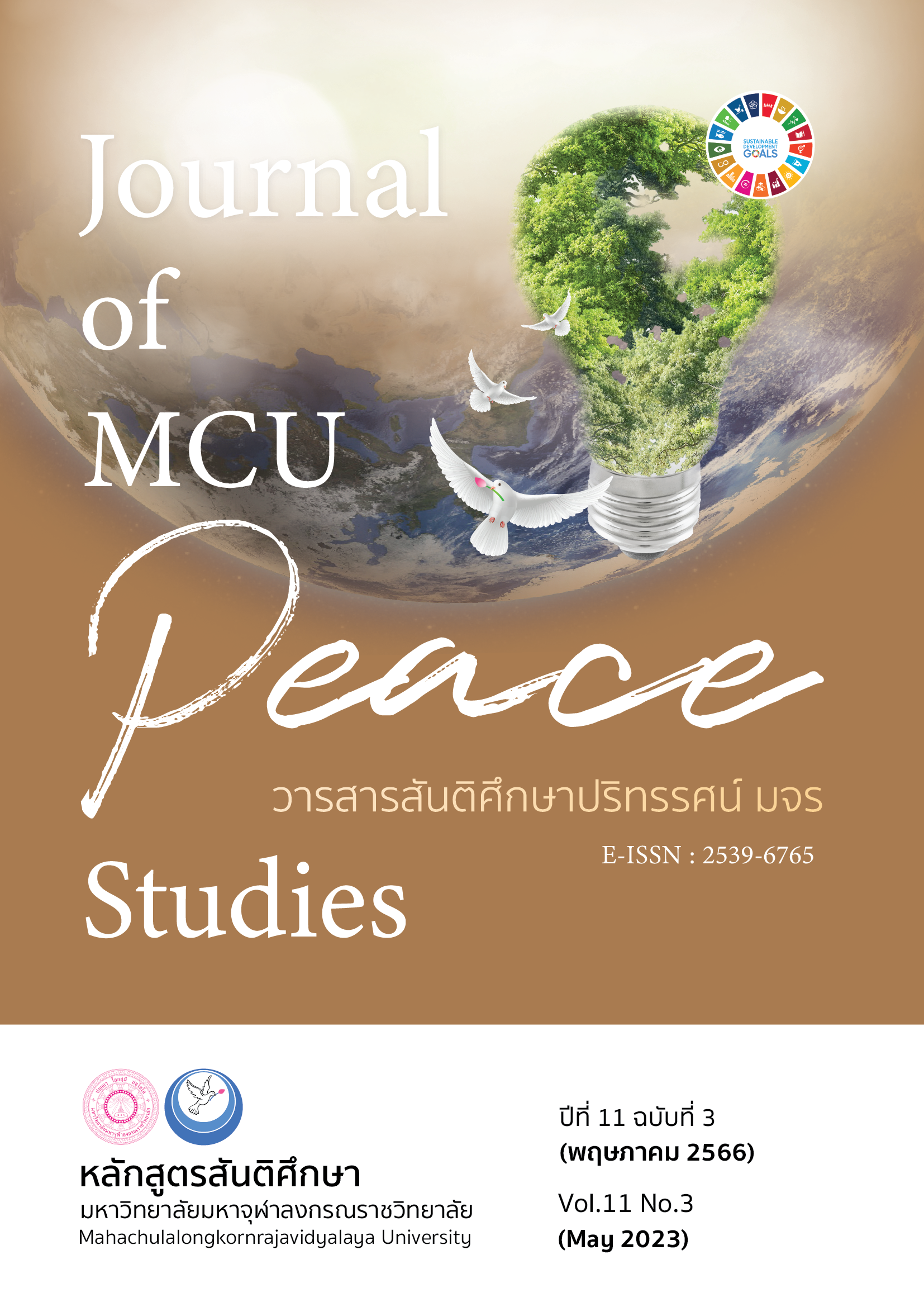ผลการพัฒนารูปแบบการจัดการเรียนรู้ตามทฤษฎีพัฒนาการพุทธิปัญญา เพื่อส่งเสริมความสามารถการแก้ปัญหาทางคณิตศาสตร์ ของนักเรียนชั้นประถมศึกษาปีที่ 6
Main Article Content
บทคัดย่อ
บทความวิจัยนี้มีวัตถุประสงค์ คือ 1) เพื่อศึกษาข้อมูลพื้นฐานที่เกี่ยวข้องกับการพัฒนารูปแบบการจัดการเรียนรู้ตามทฤษฎีพัฒนาการพุทธิปัญญา เพื่อส่งเสริมความสามารถการแก้ปัญหาทางคณิตศาสตร์ ของนักเรียนชั้นประถมศึกษาปีที่ 6 2) เพื่อพัฒนารูปแบบการจัดการเรียนรู้ตามทฤษฎีพัฒนาการพุทธิปัญญา เพื่อส่งเสริมความสามารถการแก้ปัญหาทางคณิตศาสตร์ ของนักเรียนชั้นประถมศึกษาปีที่ 6 โดยได้ดำเนินการพัฒนารูปแบบด้วยกระบวนการวิจัยและพัฒนา แบ่งการวิจัยออกเป็น 2 ระยะ ได้แก่ ระยะที่ 1 การศึกษา ข้อมูลพื้นฐานที่เกี่ยวข้องกับการพัฒนารูปแบบการจัดการเรียนรู้ และระยะที่ 2 เพื่อพัฒนารูปแบบการจัดการเรียนรู้ กลุ่มตัวอย่าง ได้แก่ นักเรียนชั้นประถมศึกษาปีที่ 6 โรงเรียนชุมชนยอดแก่งสงเคราะห์ จำนวน 30 คน ได้มาโดยการสุ่มแบบแบ่งกลุ่ม เครื่องมือที่ใช้ในการวิจัย ได้แก่ แบบสอบถามนักเรียน แบบสัมภาษณ์ครูผู้สอนคณิตศาสตร์ แบบสัมภาษณ์ผู้เชี่ยวชาญด้านการสอนคณิตศาสตร์ แบบประเมินความเหมาะสมของรูปแบบ และแบบประเมินความสอดคล้องของรูปแบบ วิเคราะห์ข้อมูล โดยใช้สถิติพื้นฐาน ได้แก่ ค่าความถี่ ร้อยละ ค่าเฉลี่ย ส่วนเบี่ยงเบนมาตรฐาน
ผลการวิจัยพบว่า 1) ผลการศึกษาข้อมูลพื้นฐานที่เกี่ยวข้องกับการพัฒนารูปแบบการจัดการเรียนรู้ตามทฤษฎีพัฒนาการพุทธิปัญญา เพื่อส่งเสริมความสามารถการแก้ปัญหาทางคณิตศาสตร์ ของนักเรียนชั้นประถมศึกษาปีที่ 6 พบว่า นักเรียนมีปัญหาเกี่ยวกับการแก้ปัญหาทางคณิตศาสตร์ อยู่ในระดับปานกลาง และต้องการเรียนรู้เพื่อส่งเสริมความสามารถการแก้ปัญหาทางคณิตศาสตร์ อยู่ในระดับมาก แนวทางในการจัดการเรียนการสอนคณิตศาสตร์ คือ นักเรียนควรเรียนรู้และลงมือปฏิบัติด้วยตนเอง จึงจะมีความรู้ ความเข้าใจที่คงทนกว่าการสอนแบบท่องจำ และเป็นการจัดการเรียนรู้ที่เน้นผู้เรียนเป็นสำคัญ นักเรียนจะใช้ความรู้ ความเข้าใจ การแสดงความคิดเห็น การแลกเปลี่ยนเรียนรู้ร่วมกัน เกี่ยวกับความคิดของตนเองในกระบวนการแก้ปัญหาทางคณิตศาสตร์ 2) ผลการพัฒนารูปแบบการจัดการเรียนรู้ตามทฤษฎีพัฒนาการพุทธิปัญญา เพื่อส่งเสริมความสามารถการแก้ปัญหาทางคณิตศาสตร์ ของนักเรียนชั้นประถมศึกษาปีที่ 6 พบว่า รูปแบบการจัดการเรียนรู้ตามทฤษฎีพัฒนาการพุทธิปัญญาเพื่อส่งเสริมความสามารถการแก้ปัญหาทางคณิตศาสตร์ ของนักเรียนชั้นประถมศึกษาปีที่ 6 ที่พัฒนาขึ้นมีทฤษฎีและแนวคิดพื้นฐานในการพัฒนารูปแบบการจัดการเรียนรู้ ได้แก่ 1) ทฤษฎีคอนสตรัคติวิสต์เชิงสังคม 2) แนวคิดอภิปัญญา และ 3) วิธีการแบบเปิด และมีขั้นตอน การเรียนรู้ 5 ขั้นตอน ประกอบด้วย 1) ขั้นการนำเสนอสถานการณ์ปัญหา 2) ขั้นหากลวิธีแก้ปัญหา 3) ขั้นดำเนินการแก้ปัญหา 4) ขั้นการอภิปราย และ 5) ขั้นสรุปการเรียนรู้
Article Details

อนุญาตภายใต้เงื่อนไข Creative Commons Attribution-NonCommercial-NoDerivatives 4.0 International License.
ทัศนะและความคิดเห็นที่ปรากฏในบทความในวารสาร ถือเป็นความรับผิดชอบของผู้เขียนบทความนั้น และไม่ถือเป็นทัศนะและความรับผิดชอบของกองบรรณาธิการ ยินยอมว่าบทความเป็นลิขสิทธิ์ของวารสาร
เอกสารอ้างอิง
Backer, J. P., & Shimada, S. (2002). The Open-Ended Approach: A New Proposal for Teaching Edited by Mathematics. Reston Virginia: National Council of Teachers of Mathematics.
Conway, K. D. (1996). The Effects of the" Open Approach" to Teaching Mathematics on Elementary Preservice Teachers' Problem-Solving Performance, Attitudes toward Mathematics, and Beliefs About Mathematics. (Doctoral Dissertation). Southern Illinois University at Carbondale, Illinois. USA.
Eaude, T. (2011). Thinking Through Pedagogy for Primary and Early Years. UK: University of Oxford.
Fuadi, I., Minarni, A., & Banjarnahor, H. (2017). Analysis of Students’ Mathematical Problem Solving Ability in IX Grade at Junior High School AR-Rahman Precut. International Journal of Novel Research in Education and Learning, 4(2), 153-159.
Harel, G., & Behr, M. (1991). Ed's “Strategy” for Solving Division Problems. The Arithmetic Teacher, 39(3), 38-40.
Hellmig, L. (2010). Effective ‘Blended’ Professional Development for Teachers of Mathematics: Design and Evaluation of the" UPOLA"-Program, in Durand-Guerrier, V., Soury Lavergne, S. and Arzarello, F. (eds.). Proceedings of CERME 6, Lyon. (pp. 1694-1703). France: Institut National de Recherche Pédagogique.
Inprasitha, M. (2010b). Project Report: Management Development of Academic Affairs in the Educational Institution Using the Innovation of “Lesson Study” and “Open Approach”. Khon Kaen: Khon Kaen Printing.
John, A., & Van De Walle, F. (2004). Elementary and Middle School Mathematics: Teaching Developmentally. Pearson Education Canada, Incorporated.
Joyce, B. R., Weil, M., & Calhoun, E. (2011). Models of Teaching 2004 (Mohammadreza Behrangi). (6th ed.). Tehran: Kamal-E-Tarbiyat Publication.
Lee, S. Y., & Chen, Y. A. (2014). An Exploration on Use of Cognitive-Metacognition Strategies for Mathematical Problem Solving. In Oesterle, S., Nicol, C., Liljedahl, P., & Allan, D. (Eds.) Proceedings of the Joint Meeting 6 – 345 of PME 38 and PME-NA 36, Vol. 6, (p. 345). Vancouver, Canada: PME.
Ministry of Education. (2017). Indicators and Core Content Group Learning Mathematics (Revised Edition B.E. 2560) According to the Basic Education Core Curriculum B.E. 2551. Bangkok: Printing Agriculture Cooperatives of Thailand.
Peranginangin, S. A., & Surya, E. (2017). An Analysis of Students’ Mathematics Problem Solving Ability in VII Grade at Smp Negeri 4 Pancurbatu. International Journal of Sciences: Basic and Applied Research (IJSBAR), 33(2), 57-67.
Pintrich, P. R. (2004). A Conceptual Framework for Assessing Motivation and Self-Regulated Learning in College Students. Educational Psychology Review, 16(4), 385-407.
Polya, G. (1981). Mathematical Discovery: On Understanding, Learning and Teaching Problem Solving, Combined Edition. New York: John Willey & Sons.
Saranrom, D. (2019). Appropriate Problem Solving Model for Managing The Education System in the Community in Digital 4.0 ERA. Journal of MCU Peace Studies, 7(5), 1192-1202.
Schmittau, J. (2004). Vygotskian Theory and Mathematics Education: Resolving the Conceptual-Procedural Dichotomy. European Journal of Psychology of Education, 19(1), 19-43.
Schoenfeld, A. H. (1985). Mathematical Problem Solving. Orlando, FL: Academic Press.
Schoenfeld, A. H. (1992). Learning to Think Mathematically: Problem-Solving, Metacognition, and Sense-Making in Mathematics, in D. A. Grouws (Ed.). Handbook on Research on Mathematics Teaching & Learning (pp. 334-370). New York: Macmillan Publishing Group.
Schraw, G., Crippen, K. J., & Hartley, K. (2006). Promoting Self-Regulation in Science Education: Metacognition as Part of a Broader Perspective on Learning. Research in Science Education, 36(1), 111-139.
Takahashi, A. (2008). “Beyond Show and Tell: Neriage for Teaching Through Problem-Solving–Ideas from Japanese Problem-Solving Approaches for Teaching Mathematics”. TSG 19: Research and Development in Problem Solving in Mathematics Education. (1-13). Mexico: DePaul University.


